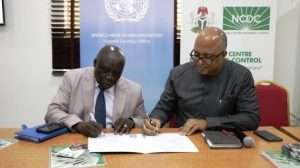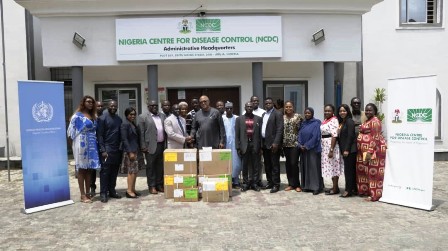
ABUJA – As the rainy season reaches its peak, the World Health Organization (WHO) and the Nigeria Centre for Disease Control (NCDC) are strengthening early warning and reporting mechanisms for prompt detection and containment of cholera outbreaks.
To this end, WHO on July 9, donated cholera kits to NCDC in line with the Nigeria’s 5-year strategic plan for cholera control to contribute to the Global Cholera Road Map (a plan that aims to reduce the global burden of cholera by 2030),.
Speaking at the handover ceremony, the Director General of the NCDC, Dr Chikwe Ihekweazu praised the WHO for providing immense support to NCDC particularly in institutional development.
“WHO has maintained strong and mutual collaborations with NCDC in outbreak response activities. We are grateful to WHO for the cholera prevention kits donated to us today and all their support thus far,” he stated.
The WHO Nigeria, Officer-in-Charge (OiC), Dr Clement Peter Lugala promised to continue to support Nigerian Government to ensure capacities are built and maintained for emergency preparedness and response.
He stressed that “WHO will continue to provide the requisite support to the Nigerian Government to promptly detect and respond to outbreaks and promote health to contribute to global cholera road map.”
Every year Nigeria experiences an increased number of cholera cases during the rainy season. In 2018, the NCDC reported a total of 42,466 cholera cases including 830 deaths (Case Fatality Ratio = 1.95%). A multi-sector multi-partner response was coordinated at the national level by NCDC and supported by WHO.
In June 2018, WHO facilitated the approval of 757,630 doses of oral cholera vaccines from the Global Task Force on Cholera Control (GTFCC) for a reactive vaccination campaign which was implemented in collaboration with the National Primary Health Care Development Agency (NPHCDA) and the Adamawa State Ministry of Health (SMOH) in two phases.
On 18 June 2019, the Adamawa State Ministry of Health declared a cholera outbreak in Yola North, Yola South, Girei and Song local government areas (LGAs). As at 15 July 2019, a total of 320 cases were reported, including three deaths: Yola North LGA, 183 cases with 2 deaths (CFR= 1.1%); Girei LGA, 118 cases with 1 death (CFR= 0.85%),18 cases with no death (CFR= 0%) in Yola South and 1 case in Song.
“Although, I had stooled thrice this morning, I would have simply stayed back at home or wished it away,” says Mallam Abdulazeez, a Community Leader in Modire, Yola North LGA. “But thanks to WHO for the knowledge I gained earlier from the people they sent to educate us on how to prevent cholera, how to identify it and why we should seek early medical attention in the nearest clinic if cholera is suspected. So I came to this cholera treatment centre by myself,” he stated.
As testified by Mallam Abdulazeez, WHO had deployed 37 community health champions to deliver health education and promotion messages to households to support Adamawa SMOH to respond to the current outbreak of cholera in Yola North, Yola South and Girei LGAs. Using information from surveillance mapping of hot spots in the affected areas, the community health champions are educating household members on cholera prevention, hygiene promotion and environmental cleanliness.
Earlier, WHO had deployed technical officers, including public health specialists, surveillance officers and members of the hard-to-reach teams to support active case search, capacity building and treatment of patients at designated centres.
Since the declaration of the current cholera outbreak in Adamawa state, WHO is working with health sector partners and the SMOH for coordinated response in order to maximize resources, limit duplication and ensure that most at risk communities are covered. Among the partners involved in the response are UNICEF, International Rescue Committee (IRC), International Organization for Migration (IOM), International Committee of the Red Cross (ICRC) and Jama Health Foundation.

